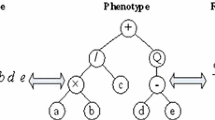Abstract
This paper studies the convergence rates of gene expression programming based on maintaining elitist (ME-GEP) by means of Markov chain and spectrum analysis. We obtain the following results: (1) ME-GEP algorithm converges to the global optimum in probability. (2) The convergence rates of ME-GEP algorithm depend on the revised spectral radius of transition matrix of Markov chain corresponding to the algorithm. (3) The upper bounds of revised spectral radius are estimated, which are determined by the parameters of ME-GEP algorithm. (4) As an application of the theoretical results acquired in the paper, the convergence rates of ME-GEP for the polynomial function modeling problem are also analyzed, which verifies the relations between the convergence rates and the algorithm parameters.
Similar content being viewed by others
References
Ferreira C. Gene Expression Programming: Mathematical Modeling by an Artificial Intelligence. 2nd ed. Berlin: Springer-Verlag, 2006
Peng J, Tang C J, Li C, et al. M-GEP: A new evolution algorithm based on multi-layer chromosomes gene expression programming (in Chinese). Chinese J Comput, 2005, 9: 1459–1466
Du X, Li Y Q, Xie D T, et al. A new algorithm of automatic programming: GEDGEP. In: The 6th International Conference on Simulated Evolution and Learning, Hefei, 2006. 292–301
Zuo J, Tang C J, Li C, et al. Time series prediction based on gene expression programming (in Chinese). Int Confer Web Inf Age, 2004, 31: 55–64
Zhou C, Xiao W M, Tirpak T M, et al. Evolving accurate and compact classification rules with gene expression programming. IEEE Trans Evolut Comput, 2003, 7: 519–531
Jia X B, Tang C J, Zuo J, et al. Mining frequent function set based on gene expression programming (in Chinese). Chinese J Comput, 2005, 28: 1247–1254
Suzuki J. A Markov chain analysis on simple genetic algorithms. IEEE Trans Syst Man Cyber, 1995, 25: 655–659
Schmitt F, Rothlauf F. On the importance of the second largest eigenvalue on the convergence rate of genetic algorithms. In: Proceedings of the Genetic and Evolutionary Computation Conference. Sanfrancisco: ACM, 2001. 559–564
He J, Kang L S. On the convergence rates of genetic algorithms. Theor Comput Sci, 1999, 229: 23–39
He J, Yu X H. Conditions for the convergence of evolutionary algorithms. J Syst Architect, 2001, 47: 601–612
Yu Y, Zhou Z H. A new approach to estimating the expected first hitting time of evolutionary algorithms. Artif Intell, 2008, 172: 1809–1832
He J, Yao X. Drift analysis and average time complexity of evolutionary algorithms. Artif Intell, 2001, 127: 57–85
He J, Yao X. A study of drift analysis of estimating computation time of evolutionary algorithms. Nat Comput, 2004, 3: 21–35
Oliveto P S, Witt C. Simplified drift analysis for proving lower bounds in evolutionary computation. In: Proceeding of the 10th International Conference on Parallel Problem Solving from Nature. Berlin: Springer-Verlag, 2008. 82–91
Yuan C A, Tang C J, Zuo J, et al. Function mining based on gene expression programming-convergence analysis and remnant-guided evolution algorithm (in Chinese). J Sichun Univ, 2004 36: 100–105
Yuan C A, Tang C J, Wen Y, et al. Convergency of genetic regression in data mining based on gene expression programming and optimized solution. Int J Comput Appl, 2006, 28: 359–366
Mitchell M. An Introduction to Genetic algorithms. Cambridge: MA MIT Press, 1998
Koza J R. Genetic Programming: On the Programming of Computers by Means of Nature Selection. Cambridge: MA MIT Press, 1992
Rudolph G. Convergence analysis of canonical genetic algorithms. IEEE Trans Neural Networ, 1994, 5: 96–101
Iosifescu M. Finite Markov Processes and Their Application. Chichester: Wiley, 1980
Horn R A, Johnson C R. Matrix Analysis. Beijing: Posts and Telecom Press, 2005
Author information
Authors and Affiliations
Corresponding author
Rights and permissions
About this article
Cite this article
Du, X., Ding, L. About the convergence rates of a class of gene expression programming. Sci. China Inf. Sci. 53, 715–728 (2010). https://doi.org/10.1007/s11432-010-0041-9
Received:
Accepted:
Published:
Issue Date:
DOI: https://doi.org/10.1007/s11432-010-0041-9




